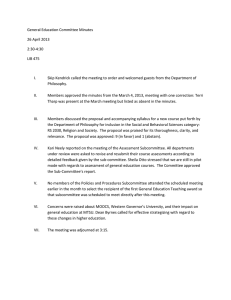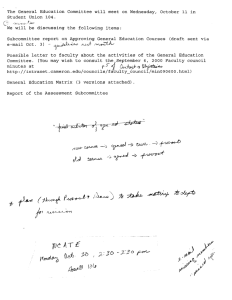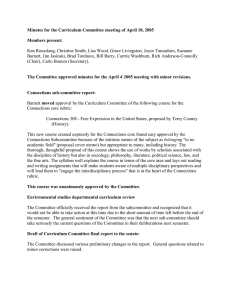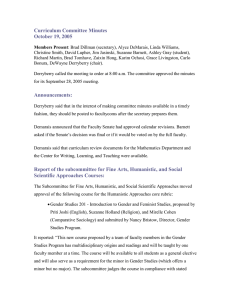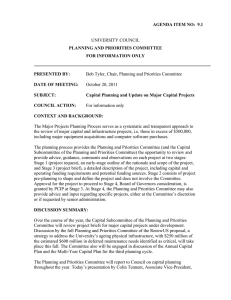April 13, 2006 meeting of the Curriculum Committee
advertisement
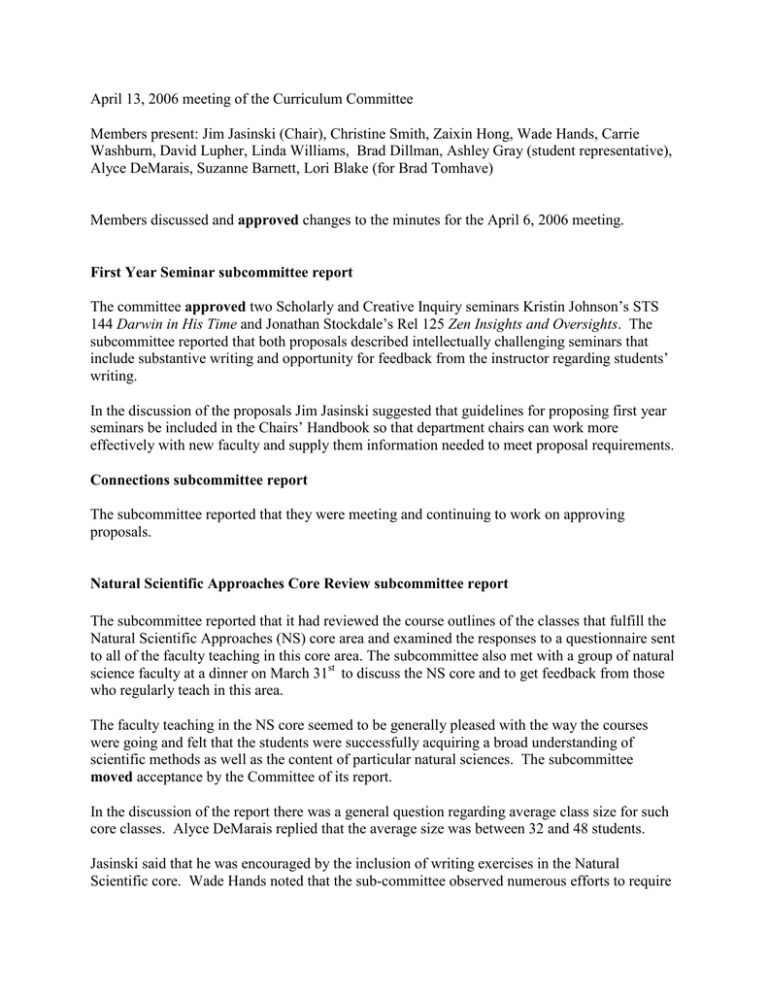
April 13, 2006 meeting of the Curriculum Committee Members present: Jim Jasinski (Chair), Christine Smith, Zaixin Hong, Wade Hands, Carrie Washburn, David Lupher, Linda Williams, Brad Dillman, Ashley Gray (student representative), Alyce DeMarais, Suzanne Barnett, Lori Blake (for Brad Tomhave) Members discussed and approved changes to the minutes for the April 6, 2006 meeting. First Year Seminar subcommittee report The committee approved two Scholarly and Creative Inquiry seminars Kristin Johnson’s STS 144 Darwin in His Time and Jonathan Stockdale’s Rel 125 Zen Insights and Oversights. The subcommittee reported that both proposals described intellectually challenging seminars that include substantive writing and opportunity for feedback from the instructor regarding students’ writing. In the discussion of the proposals Jim Jasinski suggested that guidelines for proposing first year seminars be included in the Chairs’ Handbook so that department chairs can work more effectively with new faculty and supply them information needed to meet proposal requirements. Connections subcommittee report The subcommittee reported that they were meeting and continuing to work on approving proposals. Natural Scientific Approaches Core Review subcommittee report The subcommittee reported that it had reviewed the course outlines of the classes that fulfill the Natural Scientific Approaches (NS) core area and examined the responses to a questionnaire sent to all of the faculty teaching in this core area. The subcommittee also met with a group of natural science faculty at a dinner on March 31st to discuss the NS core and to get feedback from those who regularly teach in this area. The faculty teaching in the NS core seemed to be generally pleased with the way the courses were going and felt that the students were successfully acquiring a broad understanding of scientific methods as well as the content of particular natural sciences. The subcommittee moved acceptance by the Committee of its report. In the discussion of the report there was a general question regarding average class size for such core classes. Alyce DeMarais replied that the average size was between 32 and 48 students. Jasinski said that he was encouraged by the inclusion of writing exercises in the Natural Scientific core. Wade Hands noted that the sub-committee observed numerous efforts to require certain elements in core classes that were not mandated by the core guidelines. Carrie Washburn asked whether in the sub-committee’s deliberation the issue of science (major) and non-science (major) students taking the same core class was addressed. The mixture of different kinds of students would potentially affect the make up or instruction of core classes. Washburn’s question led to a discussion of those departments that offer one core course dedicated to non-science students and one course that serves as an introduction to its majors. DeMarais explained that introduction courses are different in scope from core classes for nonmajors. Jasinski proposed the possibility that the committee ask departments to follow this model of splitting core non-science. DeMarais responded that this would not be logistically possible to require all science departments to do so. It was noted that departments have a choice in offering separate core and introductory classes and their decision to do so may reflect a variety of factors. The committee accepted the sub-committee’s report. Neuroscience Interdisciplinary Emphasis subcommittee report The subcommittee assigned to reviewing the Neuroscience Emphasis proposal is satisfied that the proposal has followed the Guidelines for the Program Designation Interdisciplinary Emphasis. This new program will, as its Mission Statement stresses, “certainly appeal to a wide audience beyond prospective students in the IE, and may be suitable as a NS core, which would serve the university as well as the new program.” The subcommittee was satisfied with the clarifications made by Professor Sue Hannaford, chair of the committee that drafted the proposal. DeMarais and Hong summarized questions that the sub-committee had for the proposers of the Emphasis. Barnett asked if the proposal included the prohibition of double counting (in classes designated to fulfill emphasis requirements) or if the committee mandated this prohibition. DeMarais explained that the structure for fulfilling emphasis requirements was elaborated upon after the sub-committee submitted its original questions. The committee was also reminded of the process for acknowledging a student’s work in Interdisciplinary Emphases in which the emphasis appears on a student’s transcript. Carlo Bonura Dept. of Politics and Government/Asian Studies Program
